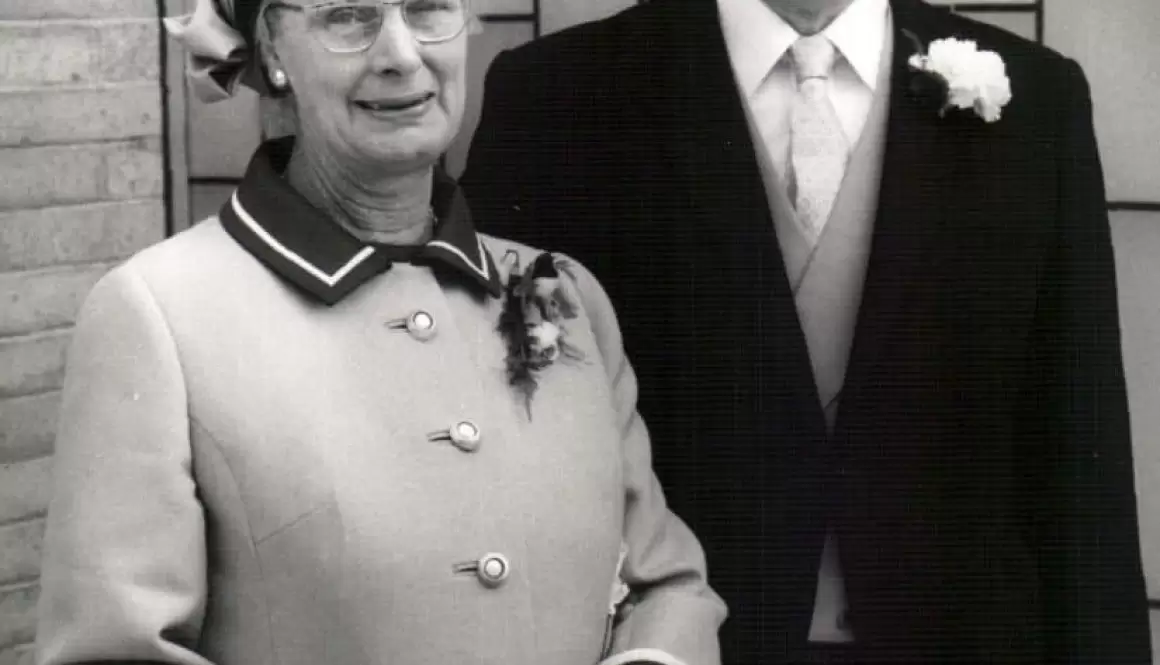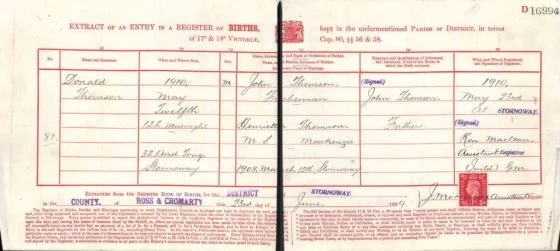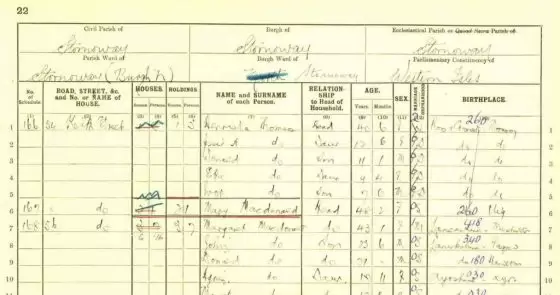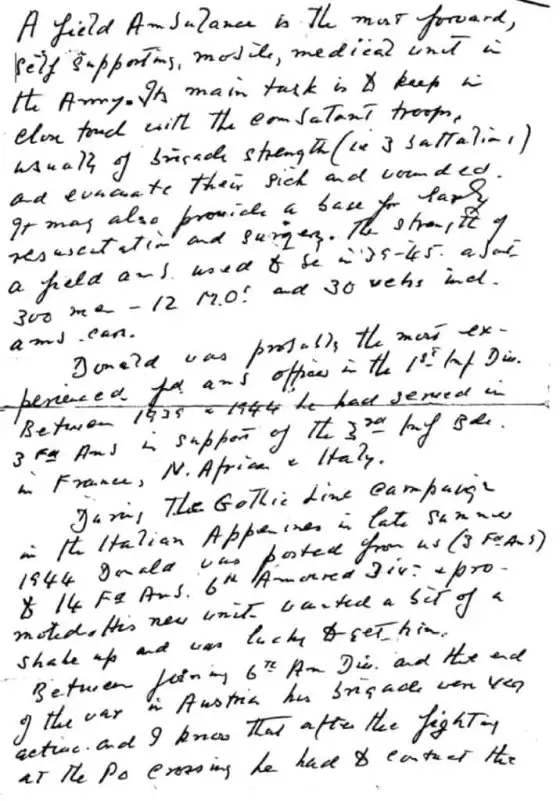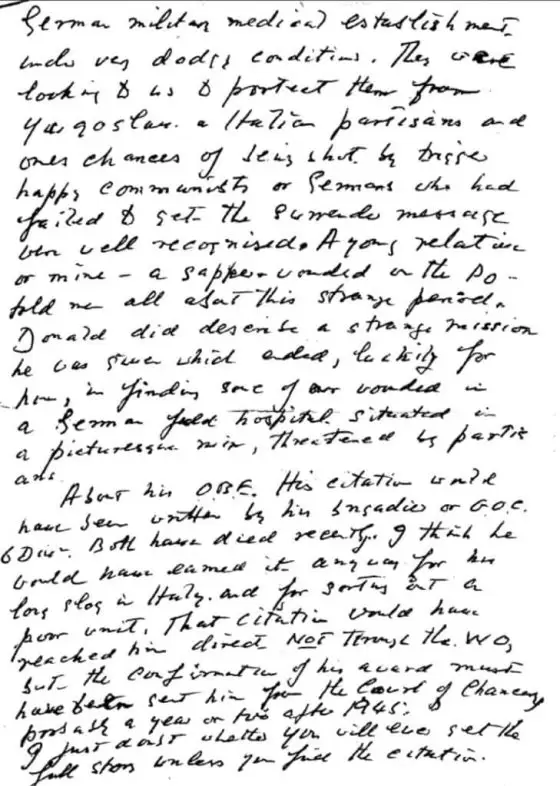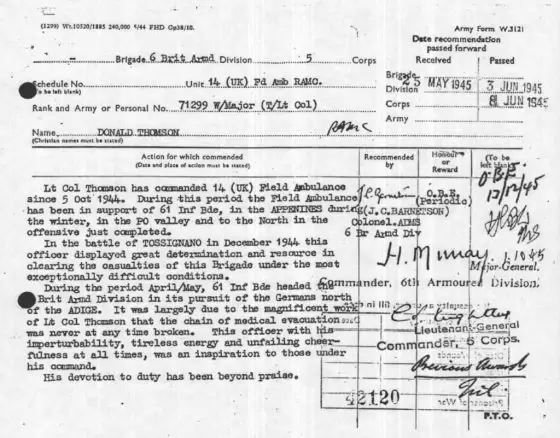Donald Thomson and Elizabeth McCann
Donald Thomson and Elizabeth McCann
Donald Thomson
Donald Thomson spent his early years at the family croft 32 Aird Tong, Isle of Lewis, Scotland until tragedy struck the family with the untimely death of his father during the First World War.
He was the son of John Thomson and Henrietta “Effie” MacKenzie and their story is told on a separate page.
Elizabeth ‘Betty’ McCann
Elizabeth McConnell McCann, known as Betty, was born in Glasgow, Scotland on 2 November 1912. She grew up in southern Glasgow, where she went to school at Hutchesons’ Grammar School. Her parents William McCann and Agnes Brown bought a house in the suburb of Netherlee, and this remained their family home until their deaths in 1960.
The story of William McCann and Agnes Brown will be told on a separate page.
Birth
Donald Thomson was born at 32 Aird Tong, Isle of Lewis Scotland on 12 May 1910, at least officially. He always said that he was actually born on the 13 May. The 13 May 1910 was a Friday and he claimed that the Hebridean Islanders were superstitious and that no parent would ever admit that their child had been born on Friday 13th. I discovered on his birth certificate that his date of birth is recorded as 12 May at 12h midnight, so maybe there was some truth to the anecdote he liked to tell.
Early Years
Donald’s father, who was a crofter fisherman, served in the Royal Naval Reserve during the First World War. He was a Leading Seaman aboard HMS Isonzo. He was lost at sea on 22 February 1917 in the Mediterranean. As a result the family were evicted from their croft, and Donald and his siblings went to stay with various MacKenzie relatives on Point until Donald’s mother found employment in Stornoway and was able to bring her four children back together.
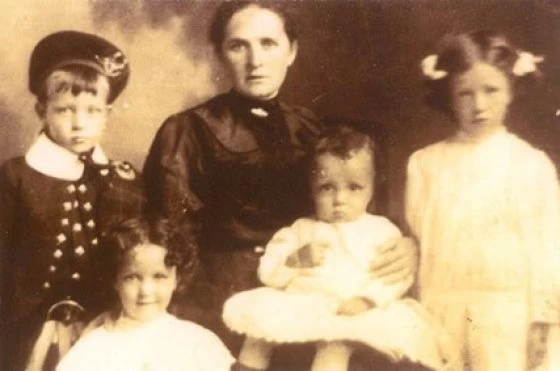
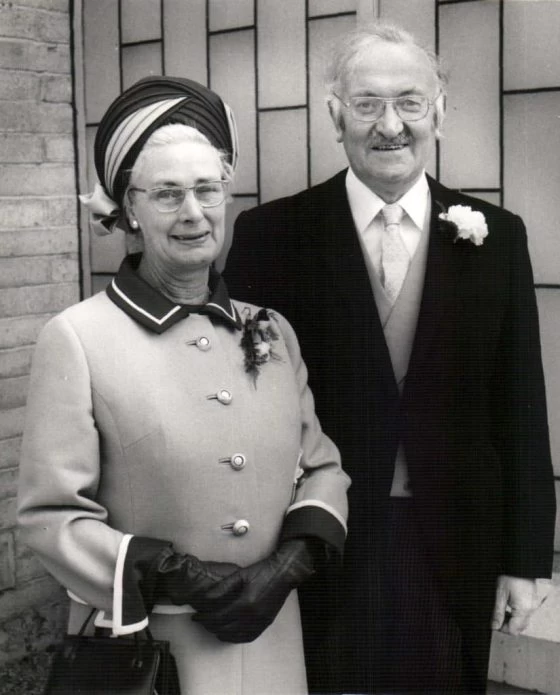
Donald & Betty in later life
Donald and Betty Thomson at the marriage of Ian and Anne in Bath in 1976.
Donald’s Childhood
Apart from his early years in Tong, Donald lived in Stornoway and attended the Nicolson Institute, winning a medal for Mathematics. The photograph opposite is a photo of his class mates at the Nicolson. Donald is first left on the back row marked with an asterisk.
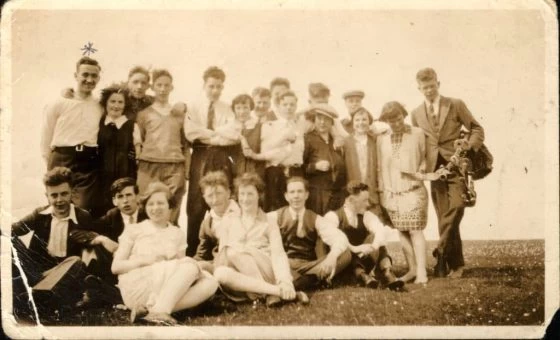
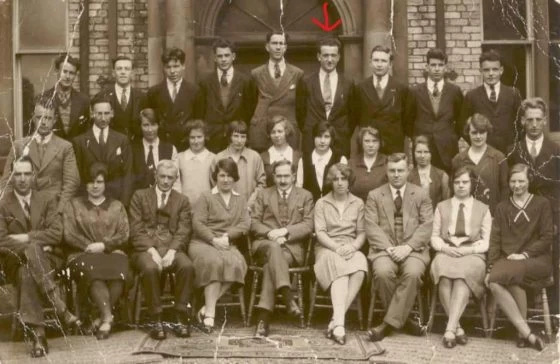
Story
Yet another class photo of Donald at the Nicolson Institute. Donald is marked with a red arrow in the back row.
Betty’s Childhood
Betty grew up in Netherlee, Glasgow, Scotland with her parents and her younger sister Janet, who was known as Jenny to her contemporary family, but who was always known to the younger generations as Aunty Jan. A source of much confusion.
The story of their parents will be told on a separate page, but they seem to have enjoyed a happy childhood. Their mother had been born in Glasgow, but the Browns originally hailed from Kilmarnock in Ayrshire.
They used to recount how they were invited to a wealthy relative who lived in Templeton Burn near Hurlford, and they used to spend the summer with other cousins staying with the family of Fred and Mynah Howie. They always said the Howies were very kind to them and used to send their chauffeur to collect them to get them out of the smoke of Glasgow for the summer months.
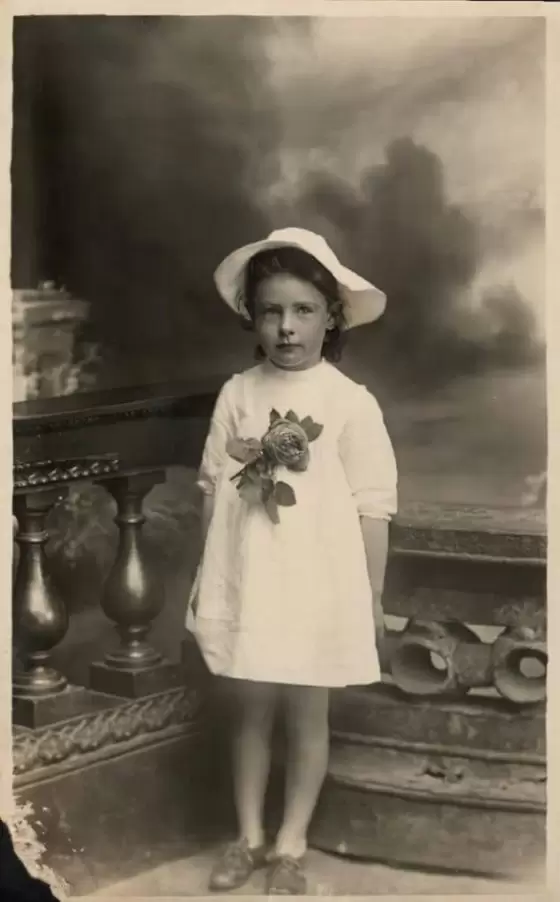
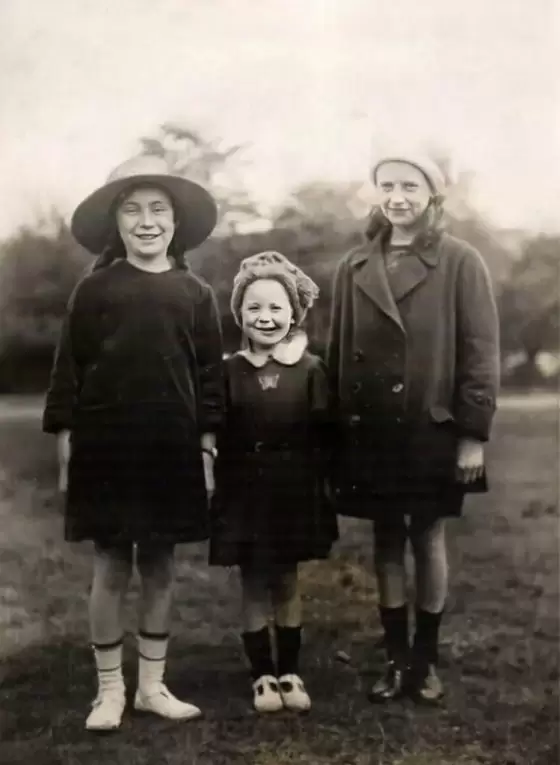
Betty’s Childhood
Betty was born in Govanhill, near Queens Park on 2 November 1912.
Donald Thomson – Graduation Photo
The photo opposite was taken in 1936, which would have been just after Donald graduated from Glasgow University, School of Medicine.
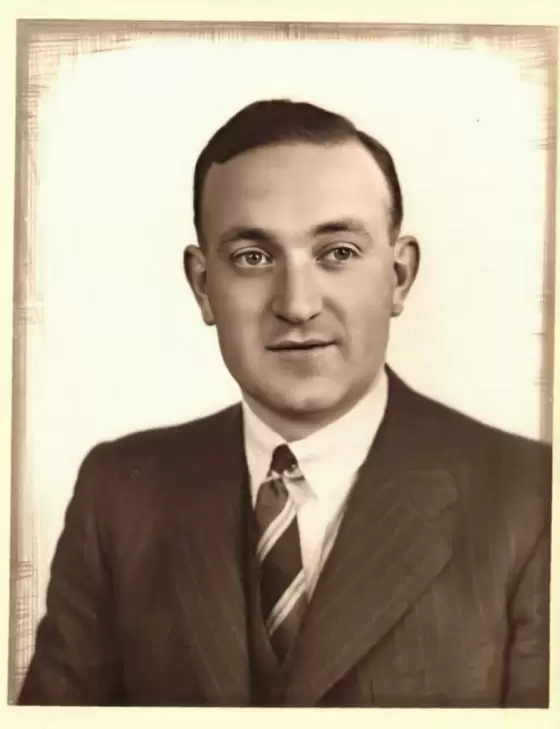
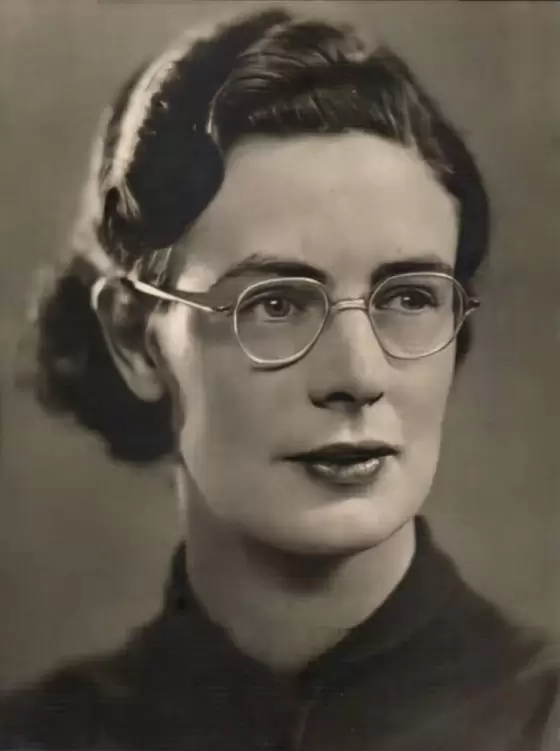
Betty McCann – Graduation Photo
This looks as though it was Betty’s graduation photo, although it was not dated on the reverse.
Military Service
Donald’s uncle, with whom he lodged in Glasgow, had served with distinction during World War One and was awarded the Military Cross for his actions in the Battle of Doiran. Perhaps his uncle persuaded Donald to sign up for the Officer Training Corps at Glasgow University.
After Donald and Betty graduated they eventually took assistant appointments, Donald in Medomsley, Consett, County Durham with a Dr MacDonald a fellow gaelic speaking Hebridean. Betty took an assistant position in Alfreton in Derbyshire.
Donald was called up in 1939 and was sent to France with the ill-fated British Expeditionary Force. Their unit moved around between Lille, Amien, Brussels and Hondschoote, before being given the order to abandon all equipment and head for the beaches at Dunkirk. He was evacuated on 29 May 1940 arriving in Ramsgate.
After kicking his heels in Lincolnshire, he was sent to Inveraray in Scotland for beach landing training. This was to prepare their unit for their landing in Algeria as part of Operation Torch creating a pincer movement driving the Afrika Korps out of North Africa. The photograph opposite was taken in Tunis, after it’s surrender in May 1943.
Donald then took part in another beach landing on the Island of Pantellaria, as part of Operation Husky, the invasion of Sicily. On this occasion the island’s defences surrendered two hours before the landing.
After Sicily, Donald took part in his third beach landing near Naples and served with 1 UK Field Ambulance, during the Italian Campaign as far north as Monte Cassino, when their unit was diverted to take part in yet another beach landing at Anzio, which eventually led to the fall of Rome in June 1944. The news of the fall of Rome was, of course, completely eclipsed by news of the D Day landings in Normandy.
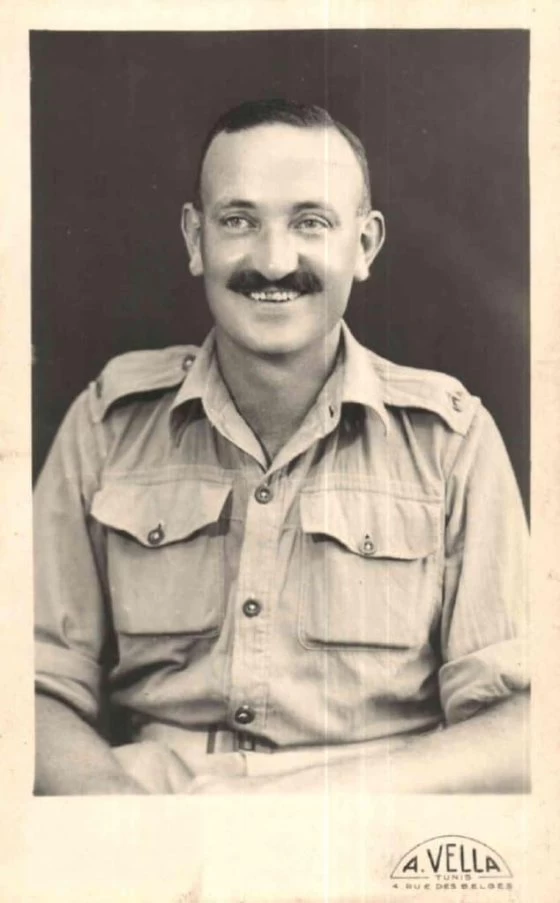
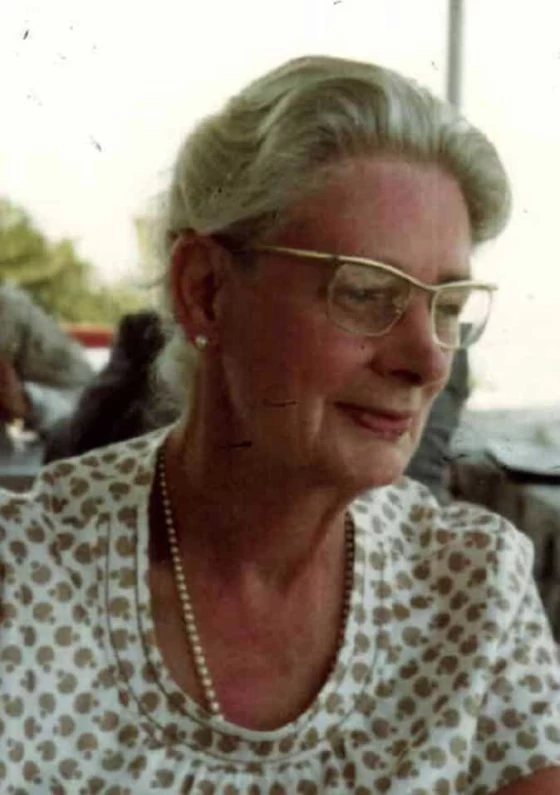
Betty’s Early Career
Immediately prior to the war, Betty and Donald had purchased a GP’s practice in Stanhope, Weardale. Donald used to like to tell the story, that the locals were initially very confused by being treated by two doctors who were both called Dr Thomson. They soon became known as Dr Thomson and Dr Thomson’s wife. Donald was then away from Weardale for five years during the war and Betty had to run the practice on her own, with the help of assistant doctors. On his return to Weardale in 1945, Donald was quite amused to realise that they had now become known as Dr Thomson and Dr Thomson’s husband.
They continued to work in General Practice in Weardale until their well earned retirement in 1975.
Tunisia 1943
Donald took part in Operation Torch, by landing in Algeria and figting their way eastwards into Tunis with the Americans to link up with Montgomery’s Eighth Army who had advanced westwards from Egypt.
After the Fall of Tunis, there was a lull in operations while the next stage of the war was considered, and Donald found himself in Hammamet as Medical Officer of Health for the town. As there were no hostilities in Tunisia, it must have seemed like a very pleasant interlude.
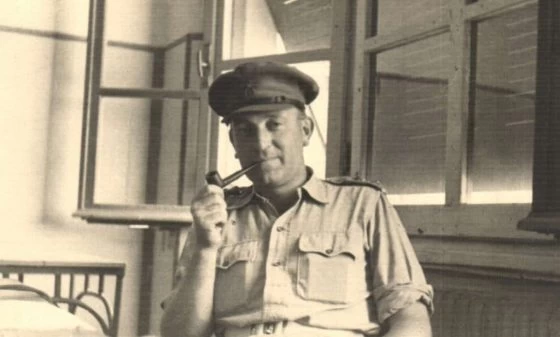
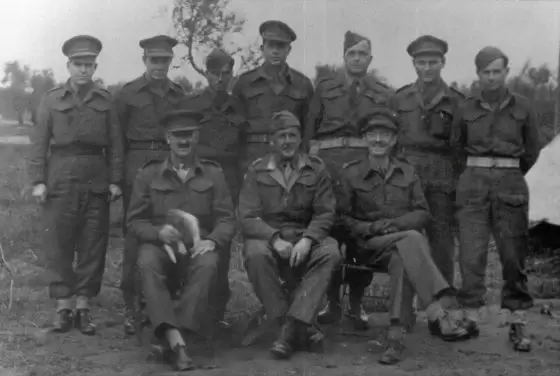
Christmas Day 1943, Cerignola, Italy
For some reason in all the photographs of my father’s unit he seems to be shown in charge of the local dog. When we were children we had a dog and I still have a dog to this day. Maybe the love of dogs is hereditary.
In the centre of the photo is my father’s CO Colonel Wood, who my father always called “Plew” as they were his initials. Plew Wood came to my father’s funeral in 1991 and told us about the citation for my father’s OBE, which he was awarded for his actions in maintaining casualty evacuation during the Battle of Tossignano in December 1944.
Tossignano, December 1944
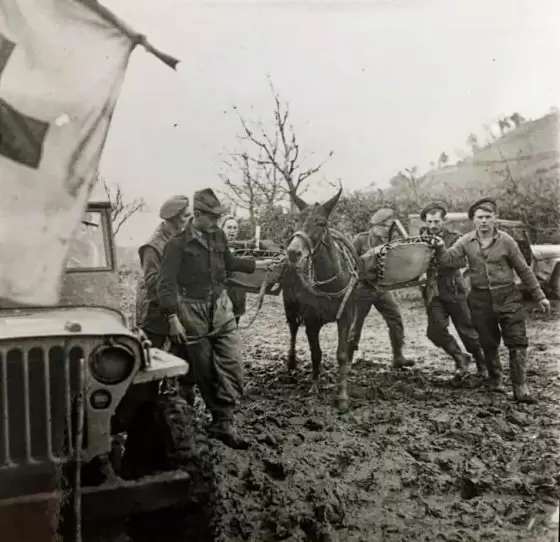
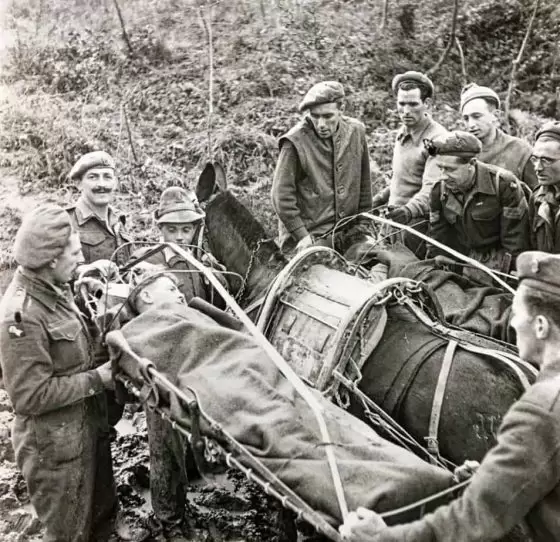
Mule Casualty Stretchers
The field Hospital was located in Castel del Rio, further up the valley from Tossignano. The winter of 1944 was severe and conditions were appalling and even the US Jeeps could not be used. With the help of the Italian Partisans and the Italian Folgori Regiment, casualties were evacuated through the mud and snow by mule.
Klagenfurt, Austria 1945
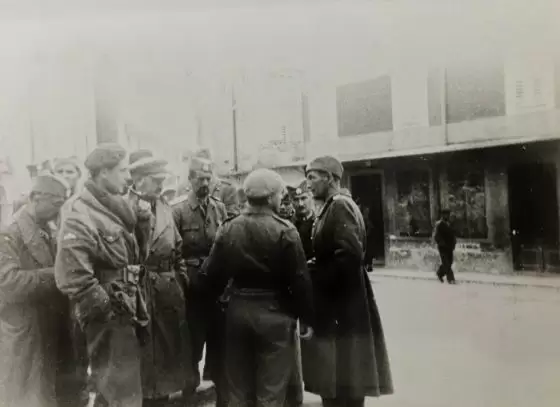
Italy 1944
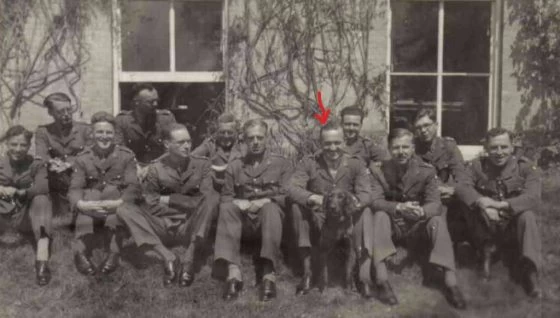
Letter from Colonel P L E Wood
The letter opposite is from Donald’s former CO, written after Donald’s funeral. I have transcribed the letter below;
A Field Ambulance is the most forward self-supporting medical unit in the Army. It’s main task is to keep in close touch with the combatant troops, usually of brigade strength (ie 3 battalions) and evacuate their sick and wounded. It may also provide a base for early resuscitation and surgery. The strength of a field ambulance used to be in 1939-45 about 300 men – 12 M.O.s and 30 vehicles including armoured cars.
Donald was probably the most experienced field ambulance officer in the 1st Infantry Division. Between 1939 and 1944 he had served in 3 Field Ambulance in support of the 3rd Infantry Brigade in France, North Africa and Italy.
During the Gothic Line Campaign in the Italian Appenines in late summer 1944 Donald was posted from us (3 Field Ambulance) to 14 Field Ambulance, 6th Armoured Division and promoted. His new unit wanted a bit of a shake up and was lucky to get him.
Between joining 6th Armoured Division and the end of the war in Austria his brigade was very active and I know that after the fighting at the Po crossing he had to contact the …….(cont below)
Letter from Colonel P L E Wood (continued)
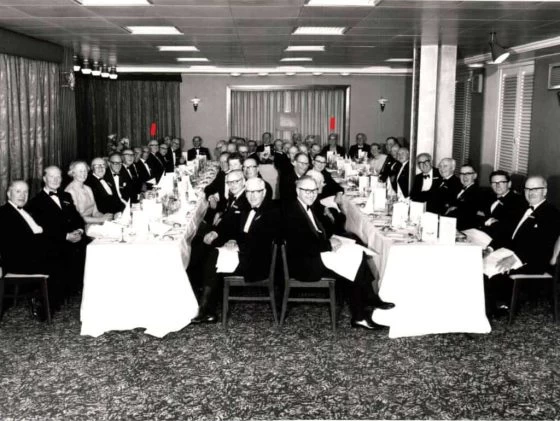
Glasgow University Medical School Reunion Dinner
In 1960, the graduates of 1935 met in Glasgow for a 25 year reunion. Donald and Betty are highlighted in red.
Donald became a magistrate in Weardale in the 1960s and served on the bench for nearly twenty years.
Family Life
After the war, Donald and Betty settled down to family life in Stanhope Weardale. They raised two children after the war, and, yes, that is me sitting next to my mother and my sister sitting next to my father.
Donald and Betty worked as country GPs in Weardale for their entire working life; they died and their ashes are buried there.
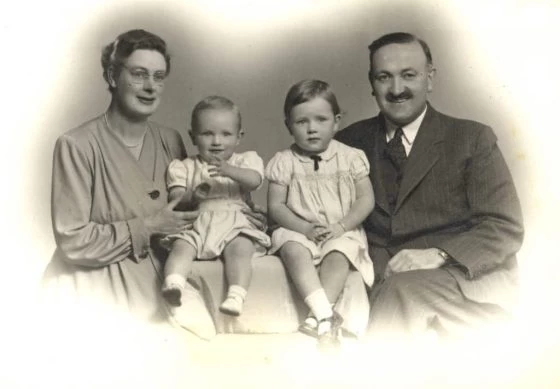
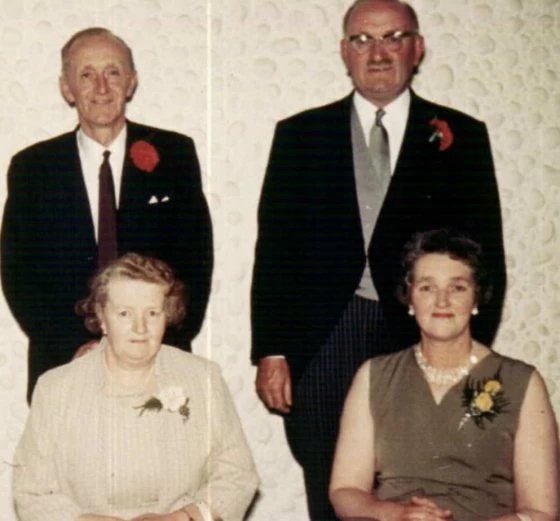
Donald’s Siblings
Donald was one of five children. His sister Johanna died in infancy at their home in Tong. Jessie Ann (bottom left) was the eldest, born in 1908, followed by Donald (top right) in 1910, and finally Henrietta “Etta” in 1912 and Ivor in 1913.
The photograph was taken in the early 1960s.
Stanhope Agricultural Society
Donald was very proud to have been elected President of the Stanhope Agricultural Society. He served as President from 1964 to 1980.
On his retirement from the role of President he was presented with an inscribed clock at the anuual agricultural show by his successor, Alec Peart and his wife Olive.
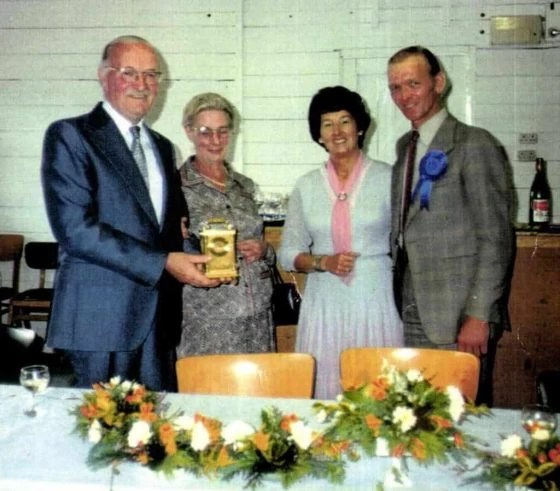
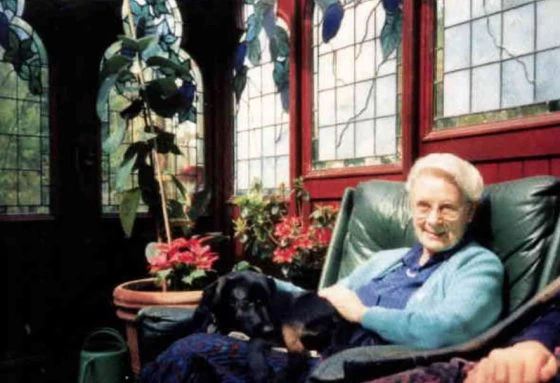
Betty McCann
This photo was taken in the conservatory of our house in the early 1990s. Our dog Pip is sitting contentedly on her lap.
